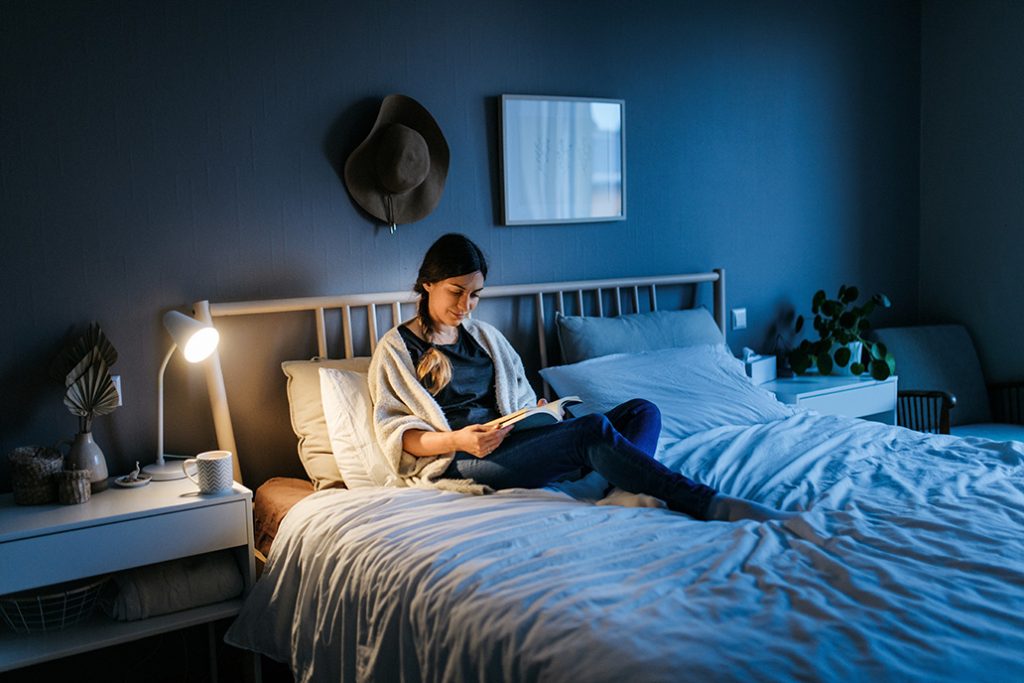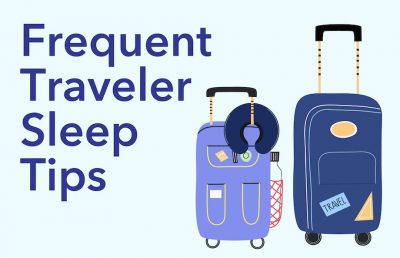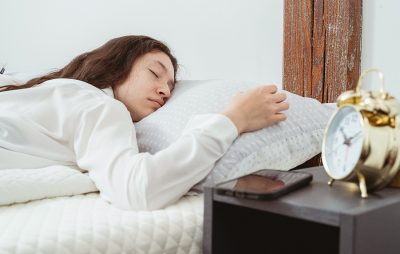Table of Contents

If a good night’s sleep feels downright unattainable, you might be surprised by what a difference a consistent bedtime routine can make. It’s a big part of sleep hygiene, which is a series of habits relating to your nighttime routines and sleeping environment. Good sleep hygiene often leads to good sleep, so setting yourself up for a restful night should begin well before your head hits the pillow. In fact, prioritizing healthy habits throughout the day is a great way to improve not only your sleep quality, but your health as a whole. Dr. Shelby Harris, the director of sleep health here at Sleepopolis, outlines the most effective sleep tips to help you fall asleep, stay asleep, and wake up feeling rested and ready for the day ahead.
Long Story Short
- Prioritizing good sleep hygiene can make it easier to fall and stay asleep.
- Make your sleeping environment conducive to sleep by keeping it dark, quiet, and cool.
- Upgrade your mattress and bedding to make it as comfortable as possible.
- Minimize daytime naps, limit alcohol, caffeine, and heavy meals before bed, and get regular exercise to help promote better sleep.
- If you’re struggling with sleep quality or quantity multiple nights per week, speak to your doctor.
Keep a Consistent Bedtime Routine
A sleep hygiene essential is going to bed at the same time every night. “The key for good sleep is consistency,” says Harris. “You shouldn’t go to sleep 90 minutes before or after your usual bedtime.” Doing so can wreak havoc on your circadian rhythm, which is the internal clock that regulates your sleep and wake cycles (1). Consistency in your sleep schedule helps regulate the circadian rhythm.
… And a Consistent Wake Up Routine
A regular bedtime is important, but so is getting up at the same time every day — and the rationale is the same. “Going to bed and waking up at the same time everyday is important to maintain your circadian rhythm and help you get better quality rest at night,” says Harris. While sleeping in on the weekends may sound tempting, this kind of inconsistency in sleep duration and timing can become problematic by disrupting your natural sleep-wake cycle.
Minimize Naps
It’s normal for the circadian rhythm to dip in the afternoon, making us feel drowsy — and a nap may sound particularly appealing (2) — but keep it short. “If you sleep well at night, then a power nap of 20 minutes early in the afternoon is great for productivity, energy, and mood,” says Harris. But if you’re having a hard time falling asleep at night, napping may be an issue. “A nap should not be a substitute for not sleeping enough at night on a routine basis,” she says. Even short naps can lower the sleep drive, which makes it harder to fall asleep and stay asleep at night.
Prioritize Relaxation Before Bed
According to Harris, prioritizing relaxation is one of the most important things you can do before bed. “Try activities that promote mindfulness, such as reading, listening to a podcast, do some deep breathing or meditation, whatever is relaxing for you to help quiet your body and brain,” she says. These sorts of calming activities, especially when they’re a regular part of your bedtime routine, help signal the body that it’s time to wind down in preparation for sleep.
Try Deep Breathing or Meditation
Breathwork and meditation are two sleep relaxation techniques that can help calm you physically, mentally and spiritually. Both techniques help guide the body into a meditative state, which makes it easier to drift off. Studies show that serotonin and melatonin levels in the body increase following meditation (3). Slow, focused breathing is likewise associated with a greater sense of relaxation, along with reduced symptoms of anger, anxiety or depression (4).
Create A Dark Sleeping Environment
Light has a major influence on the circadian rhythm, which makes light management really important at bedtime. The part of the brain that controls our internal clock responds to light, which is why we feel alert during daylight hours and sleepy when it’s dark (5).
When you’re preparing for sleep, a dark sleeping environment should be a priority. “It is important to sleep in as much darkness as possible,” Harris says. “Exposure to light in the evening can alter the body’s circadian rhythm, making it more difficult to fall asleep and get quality rest throughout the night.” If too much light is streaming into your bedroom at night, consider investing in a set of blackout curtains.
Keep a Cool Sleeping Environment
Maintaining the temperature in your sleep environment is another key pillar of good sleep hygiene. Harris says the ideal temperature range for sleep is typically between 60 and 69 degrees Fahrenheit, with most people opting for around 67 degrees.
That range supports the body’s thermoregulation process during sleep, which is how the body maintains a core temperature. This is important because thermoregulation affects the circadian rhythm: In preparation for sleep, our core body temperature drops slightly (6). A room that’s too hot or too cold can affect the body’s ability to effectively regulate itself in this way, which can make it harder to fall asleep.
Minimize Noise
Along with managing light and temperature, minimizing noise is another essential component of a restful night’s sleep. A 2022 review of multiple studies on the effects of environmental noise on sleep found that nighttime noises, including things like loud neighbors, barking dogs and traffic can lead to disrupted sleep, which is associated with a bevy of negative health outcomes (7).
While you can’t guarantee the neighbors will quiet down, you can block them out with sleep-promoting sounds. “Sleep sounds can improve sleep quality by masking any background noise during the night,” says Harris. “I recommend white or pink noise for sleeping.” These types of color noises have specific strengths and frequencies that can effectively mask disruptive noises, which can make it hard to fall or stay asleep. White noise includes all frequencies equally and makes a steady hiss, like a hair dryer or vacuum. Pink noise has a deeper, warmer sound that’s similar to steady rain or the rhythm of waves crashing on the beach.
Invest in a Good Mattress and Bedding
Being physically comfortable makes it easier to drift off, so it’s worth investing in a high-quality mattress and bedding. “When you’re comfortable and properly supported, you’ll have one less reason to struggle to fall asleep,” says Harris. Since comfort is subjective, everyone will have their own idea of what makes for a great mattress. Look for one designed for your preferred sleeping position, along with any special features that could make or break your night, such as cooling upgrades if you sleep hot or excellent motion isolation if you share your bed with a partner.
Consider your needs when you shop for sheets too. Harris says comfort is a big factor for bedding as well. “If the texture or temperature of your sheets bothers you, you may struggle to fall asleep, so it’s important to pick something that makes you feel comfortable and relaxed,” she says.
Get the Right Amount of Sleep
It’s important to get sufficient sleep every night, but that number can vary from one person to the next. “The number of hours of sleep you’ll need ranges from seven to eight hours and could even be as little as six for some people,” says Harris. “Eight is not the definite number for everyone.”
Avoid Technology Before Bed
Be mindful of the effects of blue light. “Blue light exposure from cell phones, computers, tablets, and TVs can interfere with your circadian rhythm, making it more difficult for you to fall asleep and worsen your sleep quality,” says Harris. Blue light interferes with the circadian rhythm and suppresses melatonin production, which means we feel alert instead of sleepy and ready for bed (8). Harris recommends spending at least a half hour winding down without screens before bedtime.
Limit Caffeine
Caffeine is a stimulant, which means it increases the activity of your nervous system, and it can stick around longer than you think. It has a half-life of around five hours, and your ability to metabolize it effectively depends on things like your age, weight, genetics, and other considerations (9). That means your afternoon coffee could still be in your system when it’s time for bed. To combat this, Harris recommends limiting caffeine within eight hours of bedtime.
Be Mindful of Alcohol Consumption
Alcohol has an interesting effect on sleep. “Alcohol is great to fall asleep with, but it wears off pretty quick, and when it wears off, it messes with the quality of sleep you have,” says Harris. As much as some people enjoy that evening nightcap or glass of wine, research shows that alcohol is associated with lower sleep quality, nighttime awakenings, and a reduction in sleep efficiency (10). Harris advises skipping the nightcap: “Limit alcohol within three hours of bed,” she says.
Get Your Exercise In
While researchers have yet to pinpoint exactly how regular exercise and sleep are connected, they do agree that the link exists. Experts generally agree that 30 minutes of moderate exercise is best for optimal sleep (11). Just don’t time it too close to bedtime. Harris suggests limiting strenuous exercise within three hours of going to sleep.
Be Mindful of Mealtimes
Just like caffeine, alcohol and exercise, meals should be timed to minimize negative effects on sleep. Research shows that eating close to bedtime is negatively associated with sleep quality for some people (12). To minimize this effect, Harris recommends limiting heavy meals or lots of liquids within three hours of bedtime.
What happens if you’re hungry before bed? Harris says you can snack, but do so wisely. “Having a small snack that combines protein and a carbohydrate 30 minutes to an hour before bed can help aid in sleepiness and shouldn’t interfere with nighttime sleep,” she says, “but make sure to stay away from foods high in sugar and large or spicy meals at least three hours before bedtime.” She suggests snacking on a small banana with a bit of peanut butter, or a whole wheat cracker with low-fat cheese. “Some other small snacks that can aid sleepiness include oatmeal, Greek yogurt, and cherries,” she says.
Reserve the Bed for Sleep and Sex
Build an association between your bedroom and sleep by using it exclusively for sleeping and sex. That means limiting distractions like those blue light-emitting devices, work-related clutter, and even exercise equipment, instead creating a relaxing sanctuary.
Get Up and Try Again Later
If you can’t fall asleep after getting into bed, or you wake up in the night and can’t get back to sleep, don’t push it. After twenty minutes or so (Harris advises not watching the clock, just guesstimating), get up. “Try moving to a different room and doing something relaxing to help get the mind and body back into a calm state,” she says. “Do something quiet, calm and relaxing, in dim light to pass the time. Once sleepiness comes again, get back in bed.”
Don’t Check Your Clock
If you wake in the night, don’t check the time — or your phone, either. “These blue light-emitting devices will make it more difficult to fall back asleep,” she says. Instead, she advises breathing exercises or meditating to help calm your mind and ease you back to sleep.
Keep a Sleep Diary
Using a journal to track your sleep can help you identify issues and patterns that could improve your nights (13). Keeping track of details relating to sleep and wake times, sleep quality, as well as the timing of any caffeine or alcohol use can offer useful insights. This sort of sleep tracking makes it easy to pick out patterns relating to your sleep issues. That way, you can make lifestyle changes to promote better sleep.
Consider Sleep Aids
While it’s important to speak with your doctor if you’re experiencing ongoing sleep issues, you may want to explore natural sleep aids and remedies. A bedtime cup of chamomile tea can be a welcome addition to your sleep routine. Not only is the ritual itself relaxing, chamomile really does have sleep-promoting effects (14). Lavender is another popular option. Both inhaled and ingested lavender can help reduce anxiety and promote better sleep (15) (16).
If you’re considering using melatonin for sleep, shop carefully. Harris explains that melatonin isn’t regulated by the FDA in the US like a prescription or over-the-counter drug, so there’s a lot of variability in what’s in each bottle. “There’s also no governing body making sure that what it says on the bottle is actually what’s in it,” she says. Look for a reputable brand that carries a third-party testing seal for quality, safety and purity, such as NSF International, USP or ConsumerLab, and remember to dose properly. Harris notes that anything over 3 milligrams of melatonin is considered a hefty dose. “If you need to keep taking more and more, it isn’t working,” she says.
There is some evidence that magnesium could show promise in the treatment of insomnia, but research as a whole is limited and results are mixed (17).
When to Talk to Your Doctor
“If you have multiple nights a week (3+) or feel that you routinely have trouble with the quality or quantity of your sleep multiple nights a week, talk with your doctor,” says Harris. You should also speak to your doctor if you’re feeling generally fatigued more often than not, you have problems staying asleep, or you’re experiencing disrupted sleep. Your doctor will help you identify potential issues affecting your sleep and offer remedies worth exploring. “There are lots of effective treatments that can help you get better sleep, with many that don’t require medication,” says Harris.
FAQs
What is the 10 3 2 1 0 sleep rule?
The 10 3 2 1 0 sleep rule is a handy way to remember best practices for a good night’s sleep. Here’s what it means:
- Cut out caffeine 10 hours before bed
- Stop drinking alcohol 3 hours before bed
- Stop working 2 hours before bed
- Stop screen time 1 hour before bed
By giving your body time to properly metabolize stimulating substances and wind down for sleep, you set yourself up for a better night.
What is the 5 4 3 2 1 sleep method?
More of a relaxation technique than an actual sleep method, 5 4 3 2 1 is designed to help ease symptoms of anxiety so it’s easier to relax into sleep. The technique engages the five senses to focus the mind. Bringing attention to your breath, begin taking note of the following:
- Five things you can see
- Four things you can touch
- Three things you can hear
- Two things you can smell
- One thing you can taste
At bedtime, this technique can help bring awareness to potential issues that may be impeding your ability to fall asleep. As you work your way through the list, make sure that the things you’re seeing, touching, hearing, smelling and tasting are all conducive to sleep. Remember, your sleep space should be cool, quiet, dark and relaxing.
Why can’t I fall asleep?
There could be a number of reasons that you aren’t falling asleep. Caffeine, alcohol, heavy meals, strenuous exercise, or screen time too close to bedtime may be keeping you up. A room that’s too bright, too warm, or too loud could be the culprit, as could uncomfortable bedding or an unsupportive mattress. It could also be a combination of any of these factors. Learning more about barriers to good sleep is the first step to removing them.
The Last Word From Sleepopolis
“Sleep is the bedrock upon which everything else is really built,” says Harris. “A good night’s rest can improve mood, cognitive function, lower the risk of serious health problems, and lead to an overall happier and healthier life.” There really is no substitute for quality sleep, and following these sleep tips can help ensure you’re enjoying more good nights than bad.
Sources
- McMahon WR, Ftouni S, Phillips AJK, Beatty C, Lockley SW, Rajaratnam SMW, Maruff P, Drummond SPA, Anderson C. The impact of structured sleep schedules prior to an in-laboratory study: Individual differences in sleep and circadian timing. PLoS One. 2020 Aug 12;15(8):e0236566. doi: 10.1371/journal.pone.0236566. PMID: 32785281; PMCID: PMC7423117.
- 2.Goel N, Basner M, Rao H, Dinges DF., Circadian Rhythms, Sleep Deprivation, and Human Performance, Progress in Molecular Biology and Translational Science, 2013
- JC Thambyrajah, HW Dilanthi, SM Handunnetti, DWN Dissanayake, Serum melatonin and serotonin levels in long-term skilled meditators, EXPLORE, 2024,ISSN 1550-8307, https://doi.org/10.1016/j.explore.2023.03.006.
- Zaccaro, A. et al. How Breath-Control Can Change Your Life: A Systematic Review on Psycho-Psychological Correlates of Slow Breathing. Frontiers in Human Neuroscience. 2018; DOI: 10.3389/fnhum.2018.00353
- LeGates T.A., Fernandez D.C., et al. Light as a central modulator of circadian rhythms, sleep and affect. Nature Reviews Neuroscience, Jun 11, 20146
- Harding EC, Franks NP, Wisden W. Sleep and thermoregulation. Curr Opin Physiol. 2020 Jun;15:7-13. doi: 10.1016/j.cophys.2019.11.008. PMID: 32617439; PMCID: PMC7323637.
- Smith M, Cordoza M, Basner, M. Environmental noise and effects on sleep: an update to the WHO systematic review and meta-analysis. July 11, 2022. https://doi.org/10.1289/EHP10197
- Blue light has a dark side. Harvard Health Publishing. (2020). https://www.health.harvard.edu/staying-healthy/blue-light-has-a-dark-side
- Institute of Medicine (US) Committee on Military Nutrition Research. Caffeine for the Sustainment of Mental Task Performance: Formulations for Military Operations. Washington (DC): National Academies Press (US); 2001. 2, Pharmacology of Caffeine. Available from: https://www.ncbi.nlm.nih.gov/books/NBK223808/#
- He S, Hasler BP, Chakravorty S. Alcohol and sleep-related problems. Curr Opin Psychol. 2019 Dec;30:117-122. doi: 10.1016/j.copsyc.2019.03.007. Epub 2019 Apr 19. PMID: 31128400; PMCID: PMC6801009.
- Exercising for Better Sleep. Johns Hopkins Medicine. https://www.hopkinsmedicine.org/health/wellness-and-prevention/exercising-for-better-sleep
- de Melo CM, Del Re MP, Dos Santos Quaresma MVL, Moreira Antunes HK, Togeiro SM, Lima Ribeiro SM, Tufik S, de Mello MT. Relationship of evening meal with sleep quality in obese individuals with obstructive sleep apnea. Clin Nutr ESPEN. 2019 Feb;29:231-236. doi: 10.1016/j.clnesp.2018.09.077. Epub 2018 Oct 21. PMID: 30661692.
- Care and Treatment for Sleep Disorders. Stanford Medicine. https://stanfordhealthcare.org/medical-clinics/sleep-medicine-center/tests/sleep-diary.html
- Hieu TH, Dibas M, Surya Dila KA, Sherif NA, Hashmi MU, Mahmoud M, Trang NTT, Abdullah L, Nghia TLB, Y MN, Hirayama K, Huy NT. Therapeutic efficacy and safety of chamomile for state anxiety, generalized anxiety disorder, insomnia, and sleep quality: A systematic review and meta-analysis of randomized trials and quasi-randomized trials. Phytother Res. 2019 Jun;33(6):1604-1615. doi: 10.1002/ptr.6349. Epub 2019 Apr 21. PMID: 31006899.
- Chen TY, Hiyama A, Muramatsu M, Hinotsu A. The Effect of Lavender on Sleep Quality in Individuals Without Insomnia: A Systematic Review. Holist Nurs Pract. 2022 Jul-Aug 01;36(4):223-231. doi: 10.1097/HNP.0000000000000528. PMID: 35708558.
- Luo J, Jiang W. A critical review on clinical evidence of the efficacy of lavender in sleep disorders. Phytother Res. 2022 Jun;36(6):2342-2351. doi: 10.1002/ptr.7448. Epub 2022 Apr 12. PMID: 35412693.
- Yijia Zhang and others, Association of magnesium intake with sleep duration and sleep quality: findings from the CARDIA study, Sleep, Volume 45, Issue 4, April 2022, zsab276, https://doi.org/10.1093/sleep/zsab276
Subscribe Today!
Get the latest deals, discounts, reviews, and giveaways!



